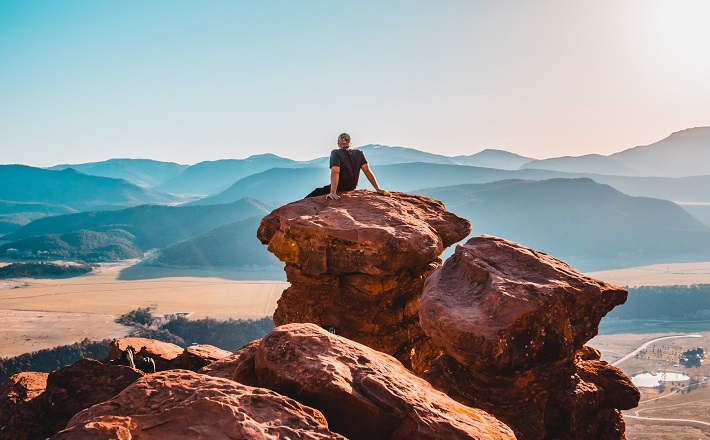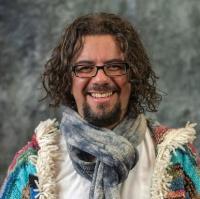Commentary on Mark 6:30-34, 53-56
Many Christians don’t have a sense of what a spiritual life is. Is it prayer? Is it reading the Bible? Is it being guided spiritually by someone?
Since we don’t have much of an idea what a spiritual practice might be, Christians tend to have a very secular sense of the spirit and tend to correlate spiritual life with daily stuff we love, such as cooking, reading, walking the dog, and so on. Very few understand that spiritual disciplines actually entail painful processes of learning to listen and to deal with our desires and our death drive.
Some Christians think that spirituality is only about justice and they throw themselves into works of justice that will change the world and themselves.
The question for us here is: What spirit do we follow? The Spirit of God or the spirit of the world? The spiritual life is often marked by existential bifurcations: Are we enticed to serve the god of mammon or the Spirit of God? This is our ongoing struggle.
Jesus is attentive to the practices of his disciples and is aware of the pulling and pushing we all go through daily. We can easily fall into the cosmetic treatment of the spirit with spiritual lotions, smoky prayers and healing baths while announcing that this kind of caring for oneself is a political act. Surely a political act embellished in neoliberal sugarcoating grasped by the spirit of mammon.
But we can also fall into the trap of working hard for the cause of justice without attending to our souls and our spiritual and emotional needs. I think this latter group is the one Jesus is concerned with and talking to here — those who do not stop to think, to meditate, to ponder, to wonder, to pay attention, to pray. To those, Jesus says: “Come away to a deserted place all by yourselves and rest a while.”
In the desert, we can have a sense of ourselves again. No noise besides our noise and the wind, no presence besides our presence and the ghosts, no company besides the plants and animals.
In the desert, there is no peace if our heart has no peace. There is only fear in the desert if our hearts live in fear.
In the desert, we must control our minds not for the sake of controlling it but rather, to be able to free ourselves from the grips of anxiety, fear, and endless movement.
In the desert, we hear the words we speak, we hear the silence we produce, we attend to the movements of our body.
In the desert, we recover our hearts back again from our cellphones, our rushed lives. The desert is not a thing in itself but a corridor that functions as a way in and out of our constant work for justice. To know ourselves (the desert) is to know what we do better (the world). Thus, to know the work we do is to know ourselves.
The world is in such a precarious situation that we need this constant movement in and out of the desert that solid spiritual practices provide. These practices become important because our presence and work as Christians in the world are fundamental to the lives of those who are the least of these. We walk around and see those who are sick, beggars, homeless, the poor. We see immigrants, they are everywhere. We attend to their needs, we welcome them home, we talk at church about how to offer shelter, how to be present, how to undo policies of hatred and debunk feelings of xenophobia, fear, and anger.
Along with the poor, the earth is also on a path of brutal destruction. We are eliminating the basic structures of the earth because of our desires, greed, and entitlement. Companies are taking over water to make bottled water, sodas, and all kinds of drinks. Agribusinesses have taken the land and destroyed it to raise cattle and plant corn and soy, all to meet our ever-growing appetites.
The sea is loaded with plastic and garbage that result from our consumerism, and overfishing depletes seas and lakes. Forests are turned into deserts, not proper for habitation much less for spiritual development. The earth, like the poor, is rushing toward us, asking to be healed. Every tree is asking us for support, every lake is crying while being poisoned by excrements from industries, every fish is begging to survive, every bird is singing to remind us of our place in creation.
We have so much to do, as Jesus says. At times, even Jesus couldn’t stop. His heart was driven by deeper compassion. But — and this is important — Jesus knew he needed to stop. Nobody can run too much and do things without stopping or getting sick.
Our task is both to be attentive to all that is crying for our attention and demanding our care. Stricken, poor human beings from all places. The earth everywhere. As people of God, we are called to discern the spirit of our times and see where the Spirit of God lives and what the Spirit is asking us to do — the work of God.
In the same way, Jesus is telling us that we have to pause and pay attention to our hearts, to our movements and to how we are living our lives. Without a strong spiritual life, oriented by daily spiritual practices of prayer and meditation, of pause and loneliness, we cannot do all the work we need to do and we cannot be all that we are called to be. A heart without action is ineffective, and an action without a heart is empty. Jesus is calling us to have a compassionate heart and to do strong actions of justice. Both things! Together!


July 22, 2018